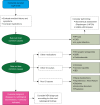Rethinking chromogranin A: unveiling gastrointestinal factors beyond neuroendocrine neoplasms-a narrative review
- PMID: 40755718
- PMCID: PMC12314672
- DOI: 10.21037/tgh-24-113
Rethinking chromogranin A: unveiling gastrointestinal factors beyond neuroendocrine neoplasms-a narrative review
Abstract
Background and objective: Chromogranin A (CgA) is extensively recognized as a biomarker in neuroendocrine neoplasms (NENs) due to its secretion alongside peptide hormones and biogenic amines in neuroendocrine cells. Despite its widespread clinical use, the reliability of CgA as a diagnostic and prognostic tool remains controversial because of its variable expression in various diseases and the influence of factors such as medication and disease characteristics. This review critically examines the role of CgA beyond neuroendocrine contexts, particularly in gastrointestinal conditions where increased levels may mislead clinical diagnostics.
Methods: This review was conducted by performing a search on the PubMed database regarding CgA and both pathological and non-pathological conditions, excluding NENs.
Key content and findings: Conditions such as chronic atrophic gastritis (CAG), proton pump inhibitor usage, and inflammatory bowel diseases (IBDs), among others, can lead to elevated CgA levels, often without any malignant association. Studies reviewed underscore the necessity for cautious interpretation of elevated CgA levels to avoid misdiagnosis and unnecessary anxiety in patients. The review further discusses the implications of non-neuroendocrine diseases contributing to elevated CgA levels, emphasizing the need for improved specificity in testing and a greater awareness among clinicians about the factors influencing CgA levels.
Conclusions: This comprehensive understanding assists in better managing patient outcomes through more accurate diagnosis and appropriate therapeutic interventions.
Keywords: Neuroendocrine tumors; accuracy; chromogranin A (CgA); diagnosis; tumor marker.
Copyright © 2025 AME Publishing Company. All rights reserved.
Conflict of interest statement
Conflicts of Interest: All authors have completed the ICMJE uniform disclosure form (available at https://tgh.amegroups.com/article/view/10.21037/tgh-24-113/coif). The authors have no conflicts of interest to declare.
Figures


References
Publication types
LinkOut - more resources
Full Text Sources
Research Materials
